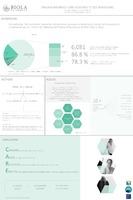Human trafficking online educational training to increase emergency nurses' knowledge, self-efficacy, skills in identification, and referral of human trafficking survivors
View File(s)
- Author(s)
- Details
-
Patricia A. Normandin DNP, RN, CEN, CPN, CPEN, FAEN
- Sigma Affiliation
- Theta at-Large
- Contributor Affiliation(s)
- Tufts Medical Center & Floating Hospital for Children, Boston, Massachusetts, USA
Visitor Statistics
Visits vs Downloads
Visitors - World Map
Top Visiting Countries
| Country | Visits |
|---|
Top Visiting Cities
| City | Visits |
|---|
Visits (last 6 months)
Downloads (last 6 months)
Popular Works for Normandin, Patricia A. by View
| Title | Page Views |
|---|
Popular Works for Normandin, Patricia A. by Download
| Title | Downloads |
|---|
View Citations
Citations
Human trafficking inclusive of forced labor is a hidden global public health epidemic that crosses all cultures, countries, ages, genders, economic incomes and families. Worldwide human trafficking is known as modern day slavery globally exploiting an estimated 40.3 million victims of human trafficking. Of these 40.3 million victims of human trafficking 81% are trapped in forced labor, 75% include women as well as girls, and 25% are children. Human trafficking and forced labor are a $150 billion industry worldwide. The National ENA has a position statement on human trafficking which identifies that emergency nurses, as well as other healthcare professionals, for unknown reasons, still do not identify survivors of human trafficking who enter the healthcare system. This is a problem because human trafficking survivors do not self-identify when they enter the healthcare system which makes it imperative that emergency nurses receive further training in human trafficking survivor’s identification and skills to care for them. In addition, emergency settings are frequently the only healthcare access for human trafficking survivors highlighting the need for further training to identify potential human trafficking survivors, offer them services and break the cycle of violence. The purpose of this study was to evaluate whether a human trafficking online educational intervention increases nurse’s knowledge, self-efficacy, and skills in identifying survivors of human trafficking.
Items submitted to a conference/event were evaluated/peer-reviewed at the time of abstract submission to the event. No other peer-review was provided prior to submission to the Sigma Repository, unless otherwise noted.
| Type | Poster |
| Acquisition | Proxy-submission |
| Review Type | Abstract Review Only: Reviewed by Event Host |
| Format | Text-based Document |
| Evidence Level | Descriptive/Correlational |
| Research Approach | Quantitative Research |
| Keywords | Emergency Nursing; Human Trafficking; Trauma-informed Care; Self-efficacy; Intervention |
| Name | EN20X – A Virtual Xperience |
| Host | Emergency Nurses Association |
| Location | Virtual Event |
| Date | 2020 |
All rights reserved by the author(s) and/or publisher(s) listed in this item record unless relinquished in whole or part by a rights notation or a Creative Commons License present in this item record.
All permission requests should be directed accordingly and not to the Sigma Repository.
All submitting authors or publishers have affirmed that when using material in their work where they do not own copyright, they have obtained permission of the copyright holder prior to submission and the rights holder has been acknowledged as necessary.
Related items
Showing items related by title, author, creator and subjects.
-
An educational intervention to increase provider knowledge in the delivery of trauma-informed care
Evangelista, Kathleen AnneThe impact of trauma on a patient's health can be devastating. Patients may become susceptible to retraumatization when seeking healthcare. Providers must recognize the concept of Trauma-Informed Care (TIC) as an essential ... -
Trauma-informed care: A response to sex trafficking
Hasegawa, Amanda E.; Yuan, Colin M.As a public health issue, sex trafficking devastates every aspect of a person's wellbeing. Nurses are ideally positioned to respond; however, literature indicates that the majority of nurses consider themselves to be ... -
Human trafficking: The efficacy of a mandatory training on the competency of emergency department providers
Adelung, Mark R.Learn about the effectiveness a mandatory educational offering on human trafficking had on emergency department providers including registered nurses, nurse practitioners, physicians, and physician assistants. -
Relationships between experiential learning and effects on senior nursing students' self-efficacy and knowledge: A non-experimental predictive correlation multiple regression analysis
Akers, Shanna WhatleyPreparing nursing students to transition into the professional registered nurse role is the task of nurse educators. These educators must train students to function in multiple nursing specialties post-graduation, to include ... -
Exploring the school nurse's knowledge, experiences, and role in trauma-informed care: Implications for school nurse practice
Rouse, Lesha H.School nurses as the only health care professional in schools with the potential to be in daily contact with students are in a critical position to create awareness, influence action, and provide leadership in trauma-informed ...





